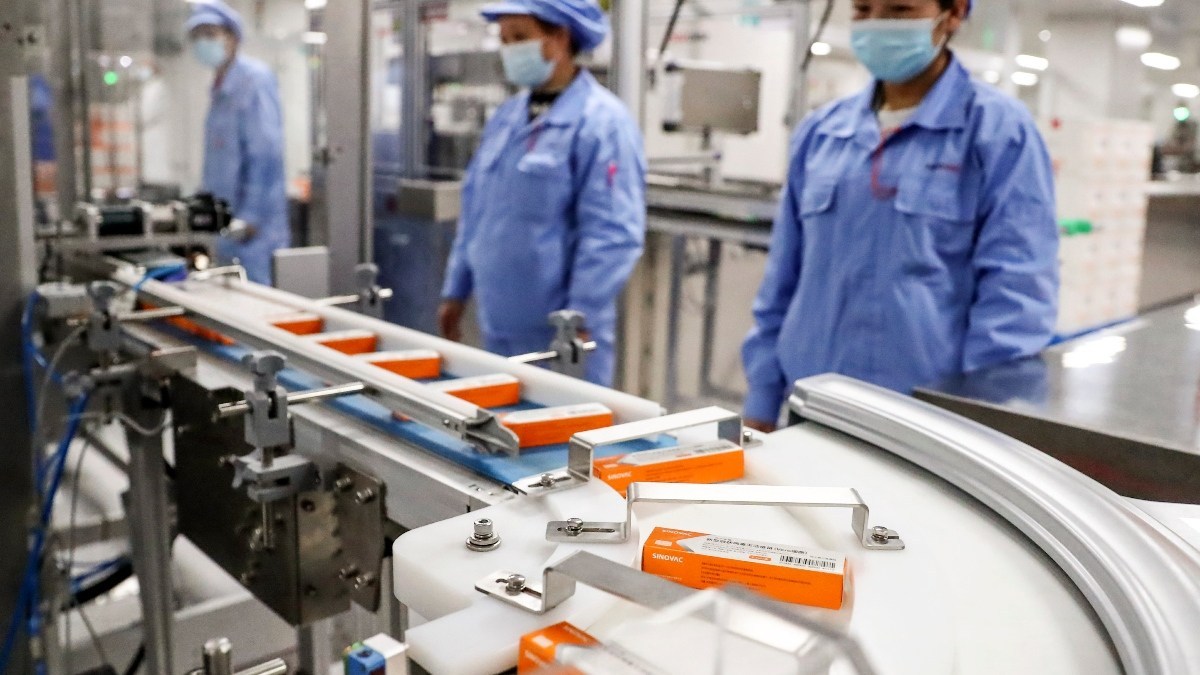[ad_1]
Hong Kong moved a step closer to starting its vaccination program on Wednesday when the government received the phase three clinical trial statistics of the Chinese-made Sinovac shot, which it will send to its medical advisory panel for approval.
Citing unnamed sources, Sing Tao Daily and the Hong Kong Economic Times reported Wednesday that Sinovac had submitted the vaccine’s statistics to the Hong Kong government at its request. The newspapers said the Health Department was analyzing the data and would let the advisory panel check and possibly approve it.
However, the reports said the public should not expect the advisory panel to approve the emergency use of the vaccine in a single meeting as more data from Sinovac could be required.
The Hong Kong government had also asked the central government for help in getting the clinical trial statistics of the Sinopharm vaccine, according to the reports. Hong Kong could not directly request the data from Sinopharm as it did not sign any purchase agreement with the mainland company.
Hong Kong’s Chief Executive Carrie Lam said Tuesday that coronavirus vaccines would only be administered in Hong Kong after they’ve been vetted by medical experts.
“The central government understands that there’s a legal framework in Hong Kong for the emergency use of any vaccines, meaning data is needed for experts’ assessment and the approval by the health secretary,†she said.
Lam said Beijing had also promised to help make sure the vaccines Hong Kong ordered from Sinovac could be successfully delivered.
She added that the vaccination program would start immediately after the delivery of the BioNTech vaccines, which would arrive in Hong Kong by the end of this month.
While Macau is also waiting for the delivery of the BioNTech vaccines, it announced Tuesday that the first batch of 100,000 doses of Covid-19 vaccines produced by Sinopharm would arrive in the Asian gaming city this week. Its vaccination program will start around the Chinese New Year holiday. There was a population of 682,800 in Macau at the end of last September.
Ao Ieong U, the Secretary for Social Affairs and Culture in Macau, said medical staff, customs officers, casino employees, teachers, drivers and students who are going to study abroad would enjoy a higher priority when getting the jabs.
The coming vaccination program will not only allow the people in Macau to resume their activities and accelerate the city’s economic recovery, but also show that the territory’s experience in the implementation of “one country, two systems†can be a good reference for Taiwan, according to a commentary published by Jornal San Wa Ou, a pro-Beijing newspaper.
In Taiwan, the vaccination program has remained slow. Lee Ping-Ing, a member of the expert team at the Central Epidemic Command Center, said the government had ordered 10 million doses of the Oxford-AstraZeneca vaccine, which would arrive on the island in March.
Lee said the government was also seeking to order the BioNTech and Moderna vaccines, while several Taiwanese pharmacy firms were developing their own vaccines, which would be available in the second half of this year.
The pro-establishment camp in Hong Kong has become increasingly impatient with the slow progress of the city’s vaccination program, especially after the government strengthened its mandatory testing scheme from Monday but could not find any new infections.
On Tuesday, the Hong Kong government locked down three areas in Sham Shui Po, Jordan and Tin Shui Wai and tested more than 2,100 people in 17 buildings. It found no new coronavirus cases.
Over the past two weeks, the government has tested about 10,000 residents in its lockdowns, and found just over a dozen infections. Lam said that success could not be measured by the number of cases found.
The government said in a statement on Tuesday that law enforcement officers could break into people’s homes and forcibly remove them if they don’t answer the door during ambush lockdowns.
Nicole Lau, a district councilor of the Democratic Alliance for the Betterment and Progress of Hong Kong (DAB), said authorities should make at least two to three attempts to reach out to residents before taking more drastic action such as breaking down their doors or prosecuting them.
She said many residents were elderly, poor or belonged to ethnic minority groups who may not be well-informed about the government’s mandatory testing measures.
DAB chairperson Starry Lee said she would ask Lam about the progress of Hong Kong’s vaccination program in a question-and-answer session in the Legislative Council on Thursday. Lee said she would also like to know how the government would promote the program to increase people’s confidence in getting the shots.
The Center for Health Protection said a total of 19 local infections were recorded on Tuesday, the lowest since November 20. Among them, seven were untraceable. The newly-identified infected included a 66-year-old man, who was found dead by police in a village house at Po Sheung Tsuen in Sheung Shui. Another 20 people tested positive preliminarily on Wednesday.
[ad_2]
Source link













